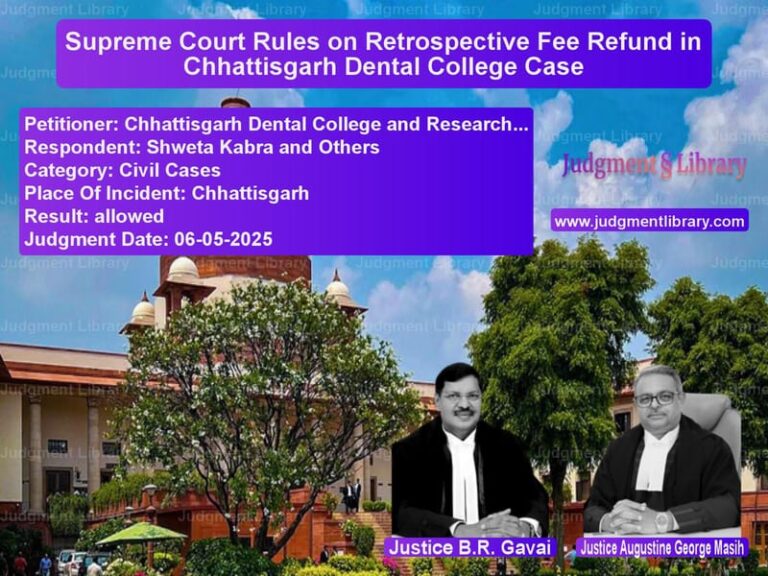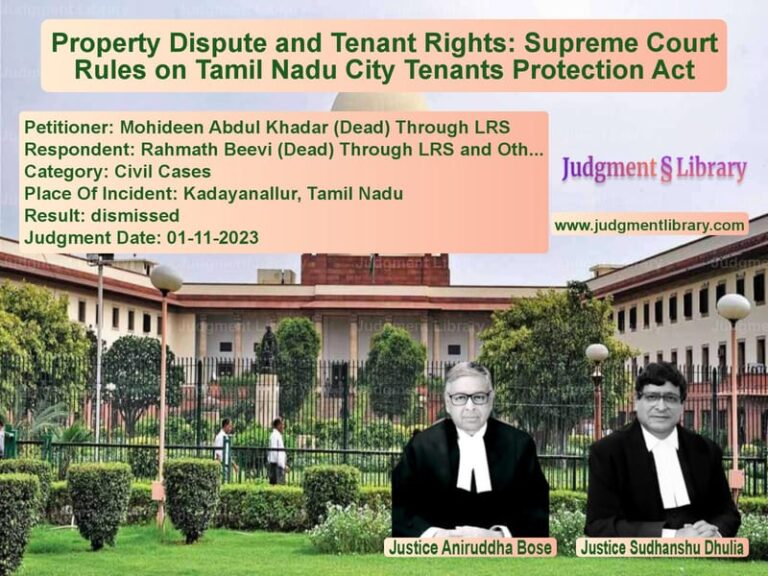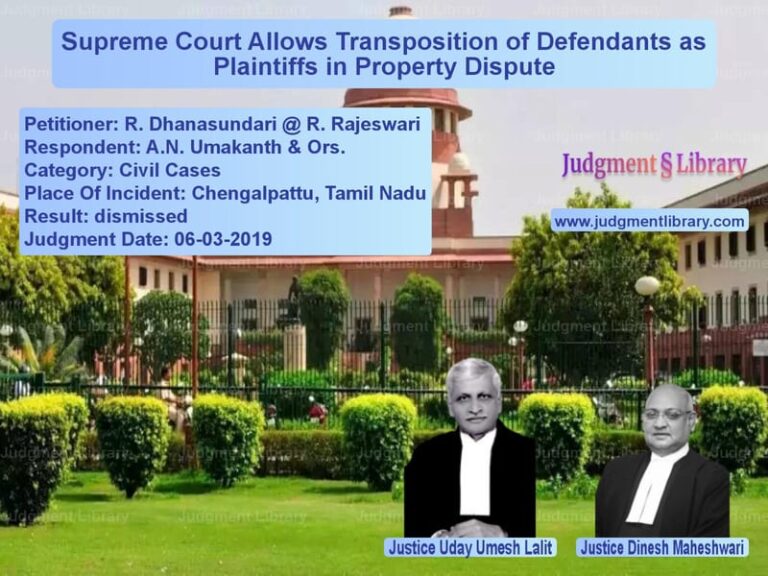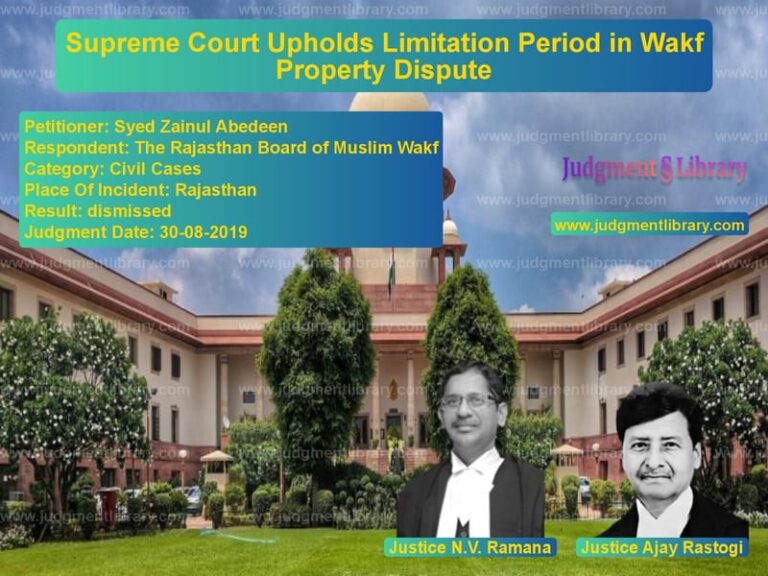Supreme Court Upholds Equal Retirement Age for Ayurvedic and Allopathic Doctors
The case of North Delhi Municipal Corporation vs. Dr. Ram Naresh Sharma & Ors. is a significant ruling concerning employment and service matters in the healthcare sector. The Supreme Court was asked to decide whether Ayurvedic doctors under the AYUSH system should have the same retirement age as allopathic doctors under the Central Health Scheme (CHS).
The dispute arose when Ayurvedic doctors employed under the North Delhi Municipal Corporation (NDMC) sought parity in their retirement age with allopathic doctors. The case reached the Supreme Court after the High Court of Delhi upheld the decision of the Central Administrative Tribunal (CAT), which ruled in favor of extending the retirement age of Ayurvedic doctors to 65 years, similar to allopathic doctors.
Background of the Case
The case stemmed from a policy decision regarding the retirement age of medical officers under different healthcare systems in India. Key facts of the case include:
- Before 2016, the retirement age for General Duty Medical Officers (GDMOs) under CHS, dentists, and AYUSH doctors was 60 years.
- On May 31, 2016, the Ministry of Health and Family Welfare raised the superannuation age of allopathic doctors in CHS to 65 years.
- On June 30, 2016, the NDMC adopted this policy but applied it only to allopathic doctors.
- The Ministry of AYUSH later enhanced the retirement age of AYUSH doctors to 65 years through an order on November 24, 2017, effective from September 27, 2017.
- However, NDMC denied this benefit to AYUSH doctors who retired between May 31, 2016, and September 27, 2017, leading to litigation.
- The Central Administrative Tribunal (CAT) ruled in favor of the AYUSH doctors, and the Delhi High Court upheld this ruling.
- NDMC appealed to the Supreme Court, challenging the extension of retirement age and the arrears of salaries.
Petitioner’s Arguments
The North Delhi Municipal Corporation (NDMC) argued that:
- The enhanced retirement age policy applied only to allopathic doctors as per the Ministry of Health and Family Welfare’s May 31, 2016, order.
- The Ministry of AYUSH’s decision to raise the retirement age of Ayurvedic doctors was a separate policy and should not be applied retrospectively.
- The Tribunal and the High Court erred in holding that Ayurvedic doctors were entitled to the benefit of the extended retirement age from May 31, 2016.
- Providing arrears of salaries would impose an unjustified financial burden on the NDMC.
Respondent’s Arguments
Dr. Ram Naresh Sharma and other Ayurvedic doctors argued that:
- There was no rational basis for excluding Ayurvedic doctors from the benefit of extended retirement age granted to allopathic doctors.
- The Ministry of AYUSH’s decision to extend the retirement age was a continuation of the policy decision taken for allopathic doctors.
- NDMC’s selective application of retirement age enhancement violated Article 14 (right to equality) of the Indian Constitution.
- Since they continued working under court orders, they were entitled to full salary arrears.
Key Legal Issues
The Supreme Court examined the following legal issues:
- Whether Ayurvedic doctors were entitled to the same retirement age as allopathic doctors.
- Whether the retirement age policy of May 31, 2016, should be extended to Ayurvedic doctors retrospectively.
- Whether NDMC’s decision to exclude Ayurvedic doctors was discriminatory.
- Whether Ayurvedic doctors were entitled to salary arrears for the period they continued working.
Court’s Observations
The Supreme Court made several significant observations:
1. Equal Retirement Age for All Doctors
The Court held that Ayurvedic doctors perform the same essential medical functions as allopathic doctors and should be treated equally in matters of service conditions.
“There is no reasonable justification for differentiating between Ayurvedic and allopathic doctors when both categories provide essential medical services to the public.”
2. Policy Implementation Must Be Fair
The Court found that the NDMC’s decision to exclude Ayurvedic doctors from the retirement age enhancement created an artificial distinction.
“Administrative actions that arbitrarily distinguish between similarly placed employees violate the principle of equality enshrined under Article 14 of the Constitution.”
3. Payment of Salary Arrears
The Court ruled that the Ayurvedic doctors who continued to serve under interim court orders must be paid full salary arrears.
“Denial of wages for services rendered amounts to forced labor and violates Articles 14, 21, and 23 of the Constitution.”
4. No Financial Excuse for Denying Rights
The Court dismissed NDMC’s argument that paying arrears would impose a financial burden, stating:
“The state cannot cite financial constraints to deny employees their lawful entitlements.”
Final Verdict
The Supreme Court dismissed NDMC’s appeal and ruled:
- Ayurvedic doctors are entitled to a retirement age of 65 years, at par with allopathic doctors.
- The enhanced retirement age shall be applied retrospectively from May 31, 2016.
- NDMC must pay full salary arrears to Ayurvedic doctors who continued working.
- All arrears must be cleared within eight weeks, failing which interest at 6% per annum shall be imposed.
The Court concluded:
“The principle of equality demands that all medical professionals, irrespective of the system of medicine they practice, be treated equally in matters of service benefits.”
Implications of the Judgment
This ruling has significant implications for the medical profession and service law:
- Equal Treatment for Ayurvedic Doctors: This ruling ensures that Ayurvedic doctors receive the same service benefits as allopathic doctors.
- Judicial Scrutiny of Discrimination: The judgment reinforces the principle that service rules must be applied fairly.
- Protection of Employee Rights: Employers cannot arbitrarily exclude a section of employees from benefits extended to others in similar positions.
- Accountability of Government Authorities: The ruling prevents government agencies from using financial constraints as an excuse to deny legitimate benefits.
Overall, this landmark ruling upholds equality in service conditions and ensures that Ayurvedic doctors receive their rightful entitlements.
Petitioner Name: North Delhi Municipal Corporation.Respondent Name: Dr. Ram Naresh Sharma & Ors..Judgment By: Justice L. Nageswara Rao, Justice Hrishikesh Roy.Place Of Incident: Delhi, India.Judgment Date: 03-08-2021.
Don’t miss out on the full details! Download the complete judgment in PDF format below and gain valuable insights instantly!
Download Judgment: north-delhi-municipa-vs-dr.-ram-naresh-sharm-supreme-court-of-india-judgment-dated-03-08-2021.pdf
Directly Download Judgment: Directly download this Judgment
See all petitions in Employment Disputes
See all petitions in Public Sector Employees
See all petitions in Pension and Gratuity
See all petitions in Contractual Employment
See all petitions in Workplace Harassment
See all petitions in Judgment by L. Nageswara Rao
See all petitions in Judgment by Hrishikesh Roy
See all petitions in dismissed
See all petitions in supreme court of India judgments August 2021
See all petitions in 2021 judgments
See all posts in Service Matters Category
See all allowed petitions in Service Matters Category
See all Dismissed petitions in Service Matters Category
See all partially allowed petitions in Service Matters Category







